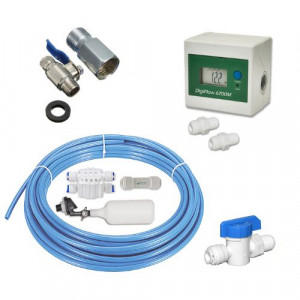Refine Search

Reverse Osmosis Water Filter
With a diverse selection of different reverse osmosis systems including HMA 3 stage heavy metal removal, 6 stage non-pumped systems, and GPD direct flow pumped systems, if you’re looking for UK reverse osmosis water filter systems, Direct Water Filters is the ideal choice.
contact us for more information or for advice regarding the reverse osmosis filtration system best suited to your needs.
What Is Reverse Osmosis?
Before we can explain reverse osmosis, it’s first important to understand the basics of the scientific process known as Osmosis. This is a process explained in both biology and chemistry as when molecules of a solvent pass through a membrane from a less concentrated solution into a more concentrated one. An example of osmosis in nature is the intake of water by plants through their roots.
In contradiction to osmosis, reverse osmosis is the process in which a solvent is pushed through a membrane, with the solvent passing through and whatever impurities in the solvent being left behind. At the heart of any reverse osmosis system is the membrane. Water is forced under pressure through the membrane to a storage tank and the waste by-product goes into drain. In addition to the membrane, reverse osmosis units also incorporate pre-filters and post filters.
Reverse osmosis systems are compact enough to be installed under most kitchen sinks. However, the units do require a minimum water pressure of 2.7 bar/40psi; so it is essential that you have your home's water pressure assessed before purchasing the unit. Small pumps, specially designed with reverse osmosis systems in mind are available if your water pressure requires boosting.
Why Do You Need To Filter Tap Water? Isn’t It Safe To Drink?
Do you know what’s inside your tap water? Generally speaking, it isn’t just H2O; chemicals such as liquefied chlorine, fluorosilicic acid, aluminium sulphate, calcium hydroxide, and sodium silicofluoride are routinely added in order to treat the water, making it safe to drink.
That being said, whilst these chemicals are needed to initially treat the water and make it safe to drink, not filtering out these chemicals could be harmful. Key scientists are now providing evidence that long-term ingestion of chemicals used to treat tap water could be causing some major health concerns Additionally, it isn’t just the treatment chemicals which are cause for concern, there’s also the issues surrounding piping. After all, water needs to travel to your home through the use of underground pipes, many of which have been underground since the Victorian times; just think of all the undesirable things that could have contaminated those pipes over the decades.
What Are The Advantages Of Using Reverse Osmosis Filters?
Whilst it sounds like a simple concept, reverse osmosis is a very powerful way of purifying water. By using reverse osmosis, it is possible to remove all suspended solids, up to 98% of dissolved solids and virtually all bacteria, pesticides and viruses.
This means that you can enjoy benefits such as an improvement in the taste, odour, and appearance of your water. Additionally, you’ll also be able to enjoy an improvement in the taste of food items which use tap water in the cooking process, such as steaming or boiling vegetables, or making soups from scratch. You’ll also be saved from any issues caused by lime scale in your kettle of coffee machine.
Signs You Need A Water Filter
Water filters such as the reverse osmosis water systems available Direct Water Filters can help with you a wide range of issues with your tap water. However, whilst in many cases tap water is adequate to drink, there are some clear signs that your home could benefit from some form of water treatment. Here’s a quick list of three:
- 1.The Taste
As mentioned above, a reserve osmosis filter can improve the taste of your water and things cooked with or in tap water. So if your tap water tastes bad, there’s clearly something wrong. After all, tap water should have no strong tastes.
- 2.The Smell
Similar to taste, tap water shouldn’t have any strong smells. So if your tap water smells like chlorine, metal, rotten eggs, or anything else ‘strange’; this is a clear sign that there are contaminants in your water and you need to remove the contaminants that are causing that smell.
- 3.The Colour
When you look at the water leaving your taps, it should be totally clear. If the water is cloudy, yellow, orange, or red; this is a clear sign that there are contaminants in your water supply. This isn’t restricted to your drinking water from the taps; you can see the effects of a contaminated water supply in other areas of your home, such as your washing machine. If your tap water supply has iron, manganese, or sulphur contaminating it, you may start to see stains in your clothes after they have been washed in a washing machine, or dishes could become stained after being washed in a dishwasher.
Filter Your Home’s Water Supply With Direct Water Filters; Make An Enquiry Today
With such a diverse selection of different filtration products to choose from, we understand if you’re feeling spoiled for choice and you’re not such which product is the best water filter for your needs.
If you’re interested in purchasing a reverse osmosis water filtration system, or if you would like more information regarding any of the different filtration products available for purchase on our online store, please don’t hesitate to get in touch with us. Our friendly and dedicated team will be happy to assist you with your enquiries.
If you would like to speak to a member of staff, please give our team a call on +44 (0) 1604 947 839. We are open Mon-Thurs 09:00-17:00 and Fridays 09:00-15:00. Alternatively, you can get in touch with our team online by filling out the enquiry form on our Contact Us page.
Reverse, Osmosis, Direct flow, pure water





